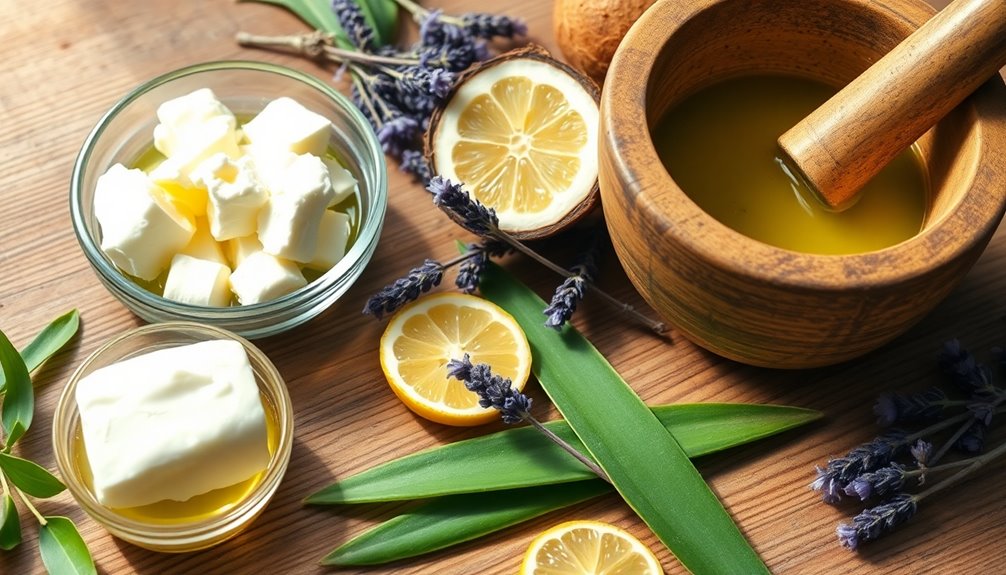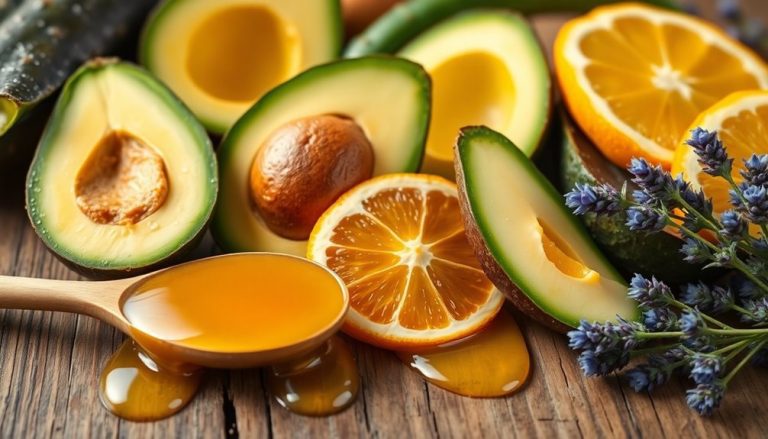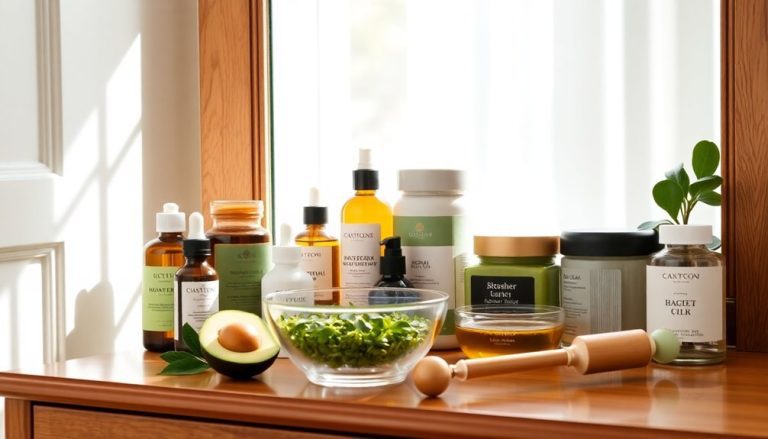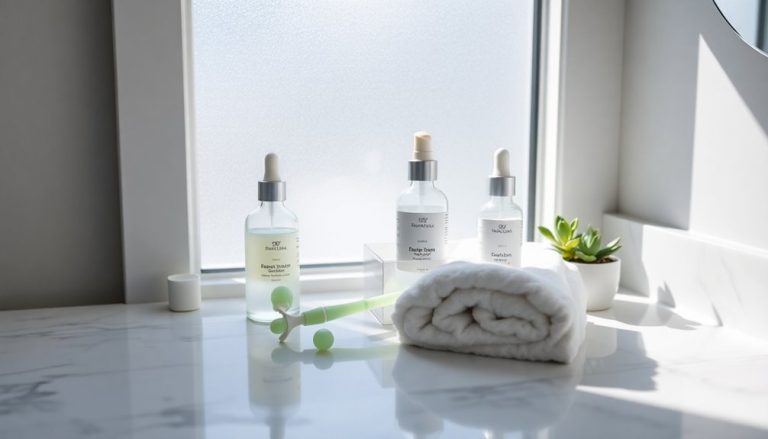If you're looking to hydrate dry skin, DIY remedies can be your best friend. Start with a soothing avocado face mask by mashing half an avocado, mixing it with honey and aloe vera. For a gentle scrub, blend coconut oil with brown sugar to exfoliate and moisturize. You can also create a nourishing oatmeal bath soak with ground oats for soothing relief. Adding essential oils like lavender or tea tree can enhance hydration and healing. These simple recipes will give your skin the nourishment it craves, and there's more to explore so you can achieve even better results!
Key Takeaways
- Soothing Avocado Face Mask: Mash half an avocado with honey and aloe vera for a hydrating face mask, leaving it on for 15-20 minutes.
- Hydrating Coconut Oil Scrub: Combine half cup coconut oil with one cup brown sugar to exfoliate and hydrate dry skin in the shower.
- Nourishing Oatmeal Bath Soak: Blend oats into a powder, add one cup to a warm bath, and soak for 15-20 minutes for soothing hydration.
- Essential Oil Blends: Create custom blends using carrier oils, like jojoba or coconut, mixed with essential oils like lavender or frankincense for added nourishment.
- Post-Care Hydration: Always apply a rich moisturizer after masks, scrubs, or baths to seal in hydration and enhance skin barrier function.
Understanding Dry Skin
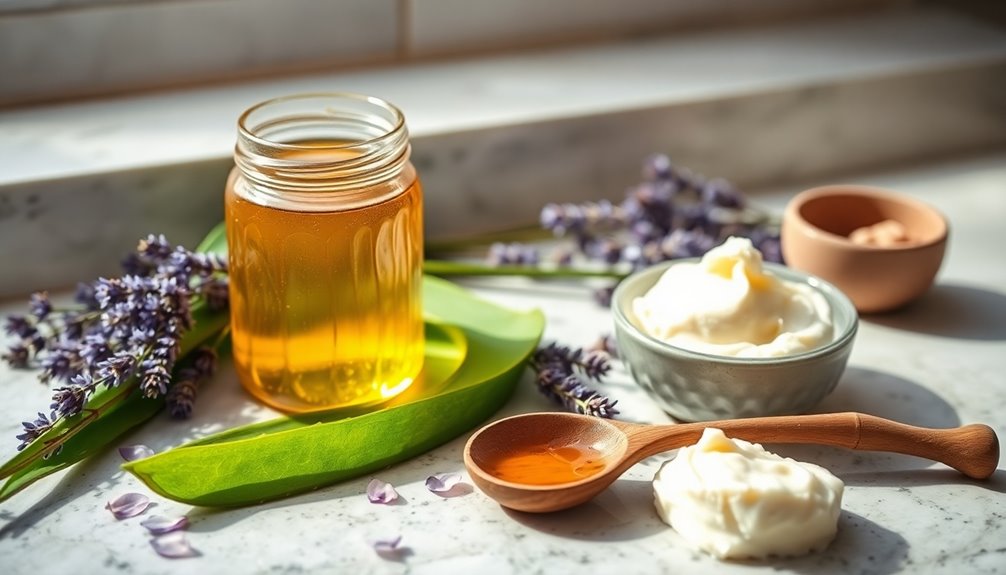
Understanding dry skin starts with recognizing its causes and symptoms. You might notice your skin feeling tight, rough, or flaky. These signs often indicate a lack of moisture, which can be due to various factors like weather, age, or lifestyle.
Dry air, especially during winter, can strip moisture from your skin, leaving it parched. Hot showers and harsh soaps might also contribute to dryness by disrupting your skin's natural oils. Incorporating Aloe Vera Gel into your skincare routine can provide an additional layer of hydration and soothing properties.
Other causes include conditions like eczema or psoriasis, which can further exacerbate dryness. If your skin tends to feel itchy or irritated, it's essential to pay attention.
Certain medications, such as diuretics or retinoids, can also lead to dry skin, so if you're on any prescriptions, consider their side effects.
You should also assess your diet, as a lack of essential fatty acids or hydration can impact your skin's health. Keeping track of these factors can help you identify the root causes of your dry skin. Additionally, incorporating a Coconut Oil Moisturizer into your routine can significantly enhance your skin's hydration levels.
Benefits of DIY Remedies
When tackling dry skin, opting for DIY remedies offers several advantages that can enhance your skincare routine. First, you gain control over the ingredients you use. By selecting natural components, you can avoid harmful chemicals often found in commercial products, which can irritate sensitive skin. This means you can tailor your remedies to suit your specific skin needs. Furthermore, incorporating luxurious bath bombs into your self-care routine can elevate your relaxation while nourishing your skin.
Additionally, DIY remedies are often more affordable than store-bought options. With simple ingredients like honey, olive oil, or oatmeal, you can create effective treatments without breaking the bank. This cost-effectiveness allows you to experiment with various combinations to find what works best for you.
You'll also enjoy the satisfaction and empowerment that comes from crafting your own skincare solutions. It's a rewarding experience that encourages self-care and mindfulness. Plus, many DIY recipes are easy to make and require minimal time and effort.
Finally, using fresh ingredients may provide better results, as they often retain essential nutrients. By incorporating DIY remedies into your routine, you'll not only hydrate your skin effectively but also create a personalized approach that reflects your unique needs and preferences. Choosing the right body lotion for your skin type can further complement your DIY efforts.
Soothing Avocado Face Mask
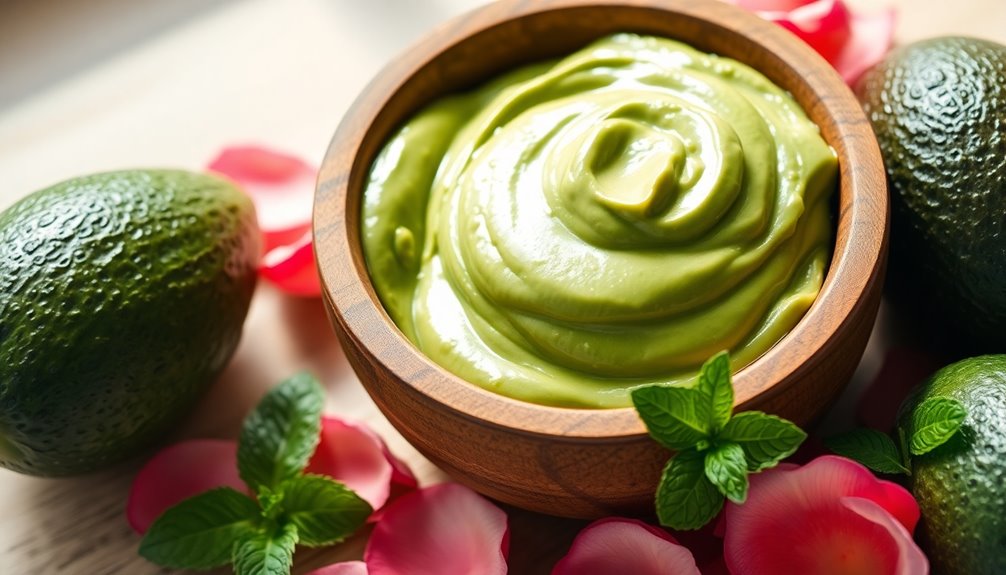
If you're looking for a nourishing remedy to combat dry skin, a soothing avocado face mask is a fantastic choice. Avocados are packed with healthy fats, vitamins, and antioxidants that hydrate and rejuvenate your skin. They help to lock in moisture while providing essential nutrients. Additionally, using a high-quality moisturizer after your mask can enhance the effects of the treatment and contribute to achieving glowing skin.
To create your own soothing avocado face mask, start by mashing half a ripe avocado in a bowl. You can mix in a tablespoon of honey for its antibacterial properties and an extra boost of hydration. If you want an added cooling effect, consider adding a few drops of aloe vera gel. Mix the ingredients until you achieve a smooth consistency.
Apply the mask to your clean, dry face, making sure to avoid the eye area. Let it sit for about 15 to 20 minutes, allowing your skin to absorb all the goodness. Rinse off with warm water and pat your face dry with a soft towel.
You'll immediately feel your skin's softness and hydration improve. Use this mask once or twice a week for the best results, and enjoy the natural glow that comes with it!
Hydrating Coconut Oil Scrub
After treating your skin to a soothing avocado face mask, you might want to enhance your hydration routine with a hydrating coconut oil scrub. This scrub not only exfoliates but also infuses your skin with moisture, making it ideal for dry skin.
To make your coconut oil scrub, combine half a cup of coconut oil with one cup of brown sugar. The sugar gently sloughs away dead skin cells, while the coconut oil deeply hydrates. You can also add a few drops of your favorite essential oil for a pleasant aroma. Lavender or eucalyptus works wonders!
When you're ready, take a small amount of the scrub and massage it onto damp skin in circular motions. Focus on areas that tend to be drier, like elbows and knees. Rinse off with warm water, and you'll instantly feel the softness.
Use this scrub once or twice a week to keep your skin smooth and supple. Just remember to store any leftovers in an airtight container to maintain freshness.
With this hydrating coconut oil scrub, you'll boost your skin's hydration and enjoy a spa-like experience right at home!
Nourishing Oatmeal Bath Soak
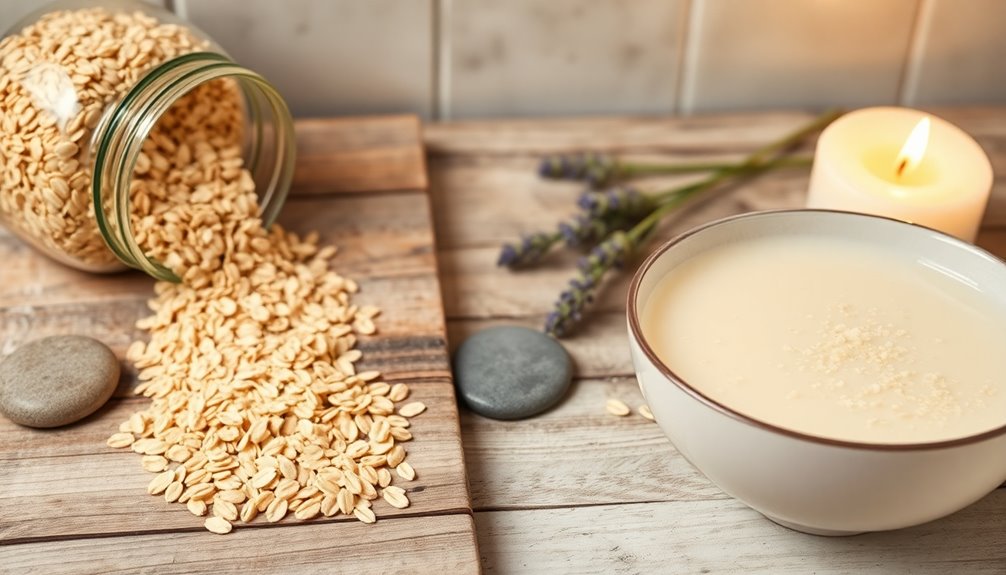
For a soothing and nourishing experience, an oatmeal bath soak can work wonders for your dry skin. Oatmeal is packed with antioxidants and anti-inflammatory properties, making it perfect for calming irritation and locking in moisture.
To create your soak, you'll need finely ground oats, which you can easily make by blending regular oats in a food processor until they reach a powdery consistency.
Start by filling your bathtub with warm water—avoid hot water, as it can strip moisture from your skin. Add about one cup of the ground oats into the water and stir to disperse. As you soak, the oatmeal will release its beneficial properties, creating a milky, soothing bath that helps hydrate your skin.
Aim to stay in the bath for at least 15-20 minutes to maximize the benefits.
After soaking, gently pat your skin dry with a soft towel and apply a rich moisturizer to seal in the hydration. You'll likely notice immediate improvements in your skin's texture and feel.
Regular oatmeal baths can be a simple yet effective remedy to combat dryness, leaving your skin feeling soft and nourished.
Calming Aloe Vera Gel
Soothe your dry skin with the cooling properties of aloe vera gel, a natural remedy known for its moisturizing and healing effects. This succulent plant's gel is rich in vitamins, antioxidants, and anti-inflammatory compounds, making it perfect for calming irritated skin.
To use aloe vera gel, simply apply a generous amount directly onto the affected areas. You can massage it in gently, allowing your skin to absorb its nutrients fully. For an extra refreshing experience, store the gel in the refrigerator before use. The cool sensation will feel especially soothing on sunburned or inflamed skin.
If you're into DIY, consider making your own aloe vera gel. You can extract the gel directly from the leaves of the plant, ensuring you get the freshest and most potent product. Just blend the inner gel with a bit of water for a smooth consistency.
You can also mix aloe vera gel with other skin-friendly ingredients, like honey or yogurt, for added hydration. This versatile gel not only hydrates but also promotes healing, making it a must-have in your dry skin remedy toolkit.
Enjoy the instant relief and nourishment it provides!
Essential Oil Blends for Hydration
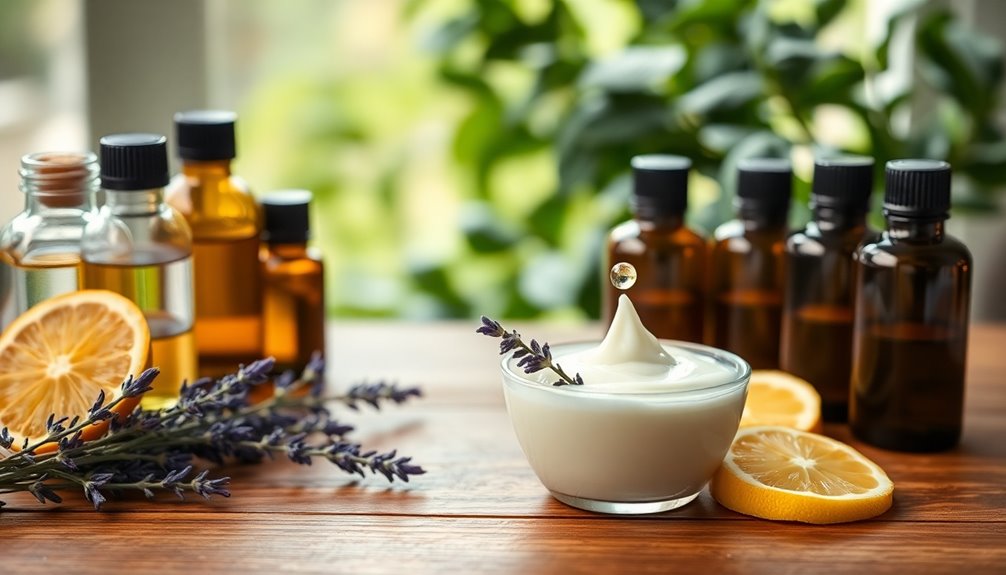
If you're looking to enhance your hydration routine, essential oil blends can be a fantastic addition to your skincare arsenal.
These blends not only provide moisture but also offer aromatherapy benefits that can uplift your spirits. By incorporating essential oils into your routine, you can effectively combat dry skin while enjoying a soothing experience.
Here are three effective essential oil blends you can create for hydration:
- Lavender and Geranium: Mix 3 drops of lavender oil with 3 drops of geranium oil in a carrier oil like jojoba or sweet almond oil. This blend promotes relaxation and balances skin moisture.
- Frankincense and Myrrh: Combine 2 drops of frankincense oil with 2 drops of myrrh oil in a base of coconut oil. This powerful duo is renowned for its anti-aging properties and deep hydration.
- Tea Tree and Eucalyptus: Blend 3 drops of tea tree oil with 3 drops of eucalyptus oil in a carrier oil. This mix not only hydrates but also helps soothe irritation and inflammation.
Incorporate these blends into your skincare routine, and you'll notice a significant improvement in your skin's hydration levels!
Frequently Asked Questions
How Often Should I Use DIY Remedies for Dry Skin?
You should use DIY remedies for dry skin as often as needed, typically two to three times a week. Listen to your skin; if it feels dry, apply your remedy more frequently for better results.
Can I Use These Remedies on Sensitive Skin?
You might worry DIY remedies could irritate sensitive skin, but many natural ingredients are gentle and soothing. Always patch test first, and if you notice irritation, stop using them and consult a dermatologist for advice.
What Ingredients Should I Avoid for Dry Skin?
You should avoid harsh fragrances, alcohol, and sulfates, as they can irritate and worsen dryness. Instead, focus on gentle, hydrating ingredients that soothe and nourish your skin without causing additional sensitivity or discomfort.
How Long Do Homemade Remedies Last?
When it comes to homemade remedies, they typically last about one week in the fridge. To keep things fresh, you've gotta use them quickly, or they'll go south before you know it!
Are There Any Side Effects From Using DIY Remedies?
Yes, there can be side effects from using DIY remedies. You might experience allergic reactions, irritation, or skin sensitivity. Always patch test new ingredients and consult a healthcare professional if you're unsure about potential risks.
Conclusion
By embracing these nourishing DIY remedies, you can soothe your dry skin, hydrate your complexion, and rejuvenate your spirit. Whether you're applying a soothing avocado mask, indulging in a hydrating coconut oil scrub, or relaxing in an oatmeal bath soak, each remedy offers unique benefits. Remember, consistency is key; with regular care and attention, you'll nourish your skin, restore your glow, and reclaim your confidence. Start today, and let your skin feel the love it deserves!

